Pablo Hernandez Rodriguez is currently External Relations Director and he decided he wanted to continue his work for AEGEE by running as a President. He has a Master degree in Law but, as he thinks that ” AEGEE as a European Students’ Forum should keep the student perspective”, he is studying for a second Master in European affairs. He will turn 25 in June and he is from AEGEE-Alicante, but he has also studied in Thessaloniki, Greece. Here is his interview!
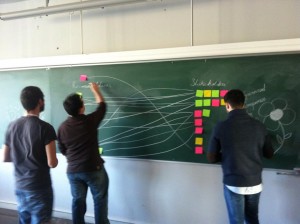 The AEGEEan: What is your vision of AEGEE?
The AEGEEan: What is your vision of AEGEE?
Pablo: AEGEE just turned 31 and if we look back, AEGEE has achieved amazing things and carried out wonderful projects. Nevertheless, what amazes me the most is the possibility to influence people’s lives by empowering them to develop themselves and to have an active role in society. In the future AEGEE has to continue wondering about its meaning and its objectives so even if it’s a mature association, there is a need of keeping renewing its purpose so we adapt to the society changes. One of the core values of AEGEE has always been its innovation and its capability to look ahead of society challenging the status quo. Now we are in a situation in which we have to start drafting the Strategic Plan and therefore, the mid-term developments of our organisation. In this sense I would want to see an emphasis on education and participation from a technological point of view foreseen the changes, that the society is going to experiment soon.
After a year spent in Bruxelles in CD working for AEGEE, what do you think is the strongest asset and what do you think is the weakest, therefore the one you need to take care of as soon as possible.
The strongest asset I have is the fact I’ve experienced what being member of the Comité Directeur is and I have acquired the needed knowledge to make the best out of the second year in Brussels. Besides the practical knowledge, my studies give me a solid background to understand how AEGEE can make a better influence. I think, that this year has also given me a clearer understanding of the network and how diverse and different it is. This means that there is a need of further analysis of the weaknesses and strengths of the locals, not limiting it to the regular updates and best practice sharing during NWMs, but creating action plans applicable to the locals.
As the biggest weakness, after being already one year in the Comité Directeur, I see the fact that there will be more members from the current team and there will be a combination of people from two different generations. We will have to find a common ground where we all feel comfortable working with each other, so that everybody has the same feeling of belonging to the team.
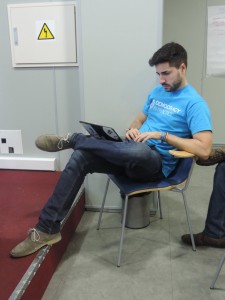 What is, according to you, the fundamental features of a President?
What is, according to you, the fundamental features of a President?
First of all, in my opinion, the president is one of the team members of the Comité Directeur and must get adapted to the needs of the six other members, so there are some crucial features that he or she has to put into practice depending on the rest of the people. To my opinion, the President has to be the one motivating the team members to keep believing in the common project and having an overview of the situation of all the team members. The president should also have an analytical mindset to constantly check the development of the projects and detect the possible deviations in the plan so there is the margin to correct them.
What was your biggest achievement in you first term as CD?
I take this question not only as a personal one, as the achievements I got are the achievements of the whole team.
I think that in this term one of the main achievements we have got is putting into practice the idea of the AEGEE day and we hope to see that the network feels the ownership of this and repeats it year after year. There are many other examples of achievements of the team, as for example the development of some new projects, the proximity to the members, the implementation of the FR strategy, etc. As a personal achievement, more on the side of personal development, I think that it has been a great experience having to coordinate the task division of the two employees I worked with in the MY-WAY project and delivering quality results to the rest of the partners.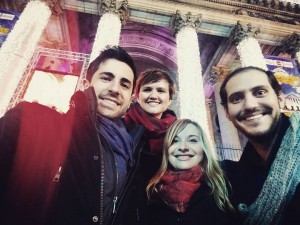
In your last point of your candidature you wrote “Thematic activities”, but it is a very general term. What is your Idea of them? How would you ensure that locals will be willing to organise them more?
We have analysed in several occasions, which are our strengths, our weaknesses, our opportunities and our threats and we have realised that there is a structural problem. AEGEE invests the majority of its efforts into self-sustaining activities, the AGORA and the EPM, meaning that our focus keeps being the organisation of Statutory Events, rather than the organisation of activities, that develop what AEGEE strives for. When I refer to thematic activities I want to point out the need of AEGEE to continue encouraging the organisation of things related to the core values of AEGEE and mainly following the Focus Areas. The AEGEE day is a good example of how the locals can be stimulated to arrange thematic activities by giving on the one hand recognition and guidance, and on the other hand visibility of their ideas.
AEGEE’s history is based on societal anticipation, and if we want to keep being a reference for innovation and a good barometer of the changes, that the society is going to experience in the future, we have to continue looking ahead (may be longer than three years’ time) and think how do we see ideal Europe.
How would you create a pool of experts on Erasmus +? What will be their tasks?
Many of us have been members of the projects, that depend on Erasmus+ grants, that are hardly ever given due to the lack of experience at grants writing. Other people have also experienced the same in their locals with frustrating results.
My idea is to identify, who in the network has skills to help in the grant writing of an Erasmus+ application, so we can put in contact those who need the help with the ones who can provide it. Additionally, what I would want to see from that group of people, is the development of a training on Erasmus+ to act as multipliers in our network. This project has to have a coordination with the Academy, as some of their members meet the criteria to be Erasmus+ experts so we don’t create duplicates, but work together. For other grants, as the Operating Grant, EYF or others, I would also like to build a network of experts that can help in the future to make the best out of the opportunities that are available to us.
In your program you mentioned the concept of “Borderless Europe” a lot, one of the principles of our organisation that does not have a national level. How do you place yourself, then, when speaking about La Federacion, that has a statute, a board and a registered office, therefore being de facto a registered organisation?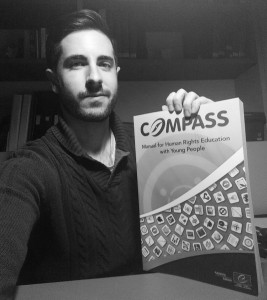
The way I understand that AEGEE strives for a Borderless Europe doesn’t have just one face, but several ones. AEGEE aims at breaking employment borders, inclusion borders, mobility borders, language borders, etc., and this should be understood in a context of respect to diversity. The barriers, that the dichotomy West vs East or EU vs non-EU create should be tackled actively by our association, advocating for our ideas wherever we should be heard. The example of la Federation, the Dutch representation in the National Youth Council or activities organised by several antennae show the willingness of the network to not depend just on AEGEE-Europe to carry out activities that develop our values. The absence of national is a great advantage, so we make decisions based in the local and European realities. But we have to wonder if we are being sufficiently inclusive with all parts of the network. For instance, as a great majority of previous CD members were EU citizens and that might be caused by the fact that the Head office is in an EU country, we receive EU funds and only a few Statutory events happen in non-EU countries.
You put a lot of emphasis on the IT development of the organisation. Do you think we have the capacities (both in terms of finances and Human Resources) for developing it further? If not, what are your solutions to implement them?
In my opinion AEGEE is getting professionalised in almost every field. As it happened in the past with accountancy, now there has to be a small revolution in terms of Secretariat organisation, IT infrastructure, Financial management, FR, diversification of funding, etc. If it was not done in the past, it was not due to the lack of willingness, but as you say, because of economic and human resources reasons.
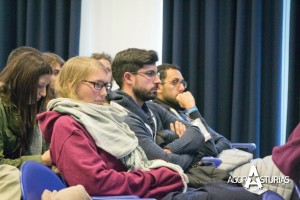 Luckily, I think that we are moving in the right direction to achieve some of the mentioned goals. In regard of IT developments, we have recently signed a contract with Campus Iberus – Excellence Campus that allows us to have trainees in the field of IT and others, so with no financial implication we would be increasing our human resources. Also an increase of the effectively of the ITC and its visibility should be done accordingly, ensuring Knowledge Transfer and a good performance of our services.
Luckily, I think that we are moving in the right direction to achieve some of the mentioned goals. In regard of IT developments, we have recently signed a contract with Campus Iberus – Excellence Campus that allows us to have trainees in the field of IT and others, so with no financial implication we would be increasing our human resources. Also an increase of the effectively of the ITC and its visibility should be done accordingly, ensuring Knowledge Transfer and a good performance of our services.
You can read his full candidature here, the second part of the interview here and his portfolio article here.
Written by Erika Bettin, AEGEE-Verona

